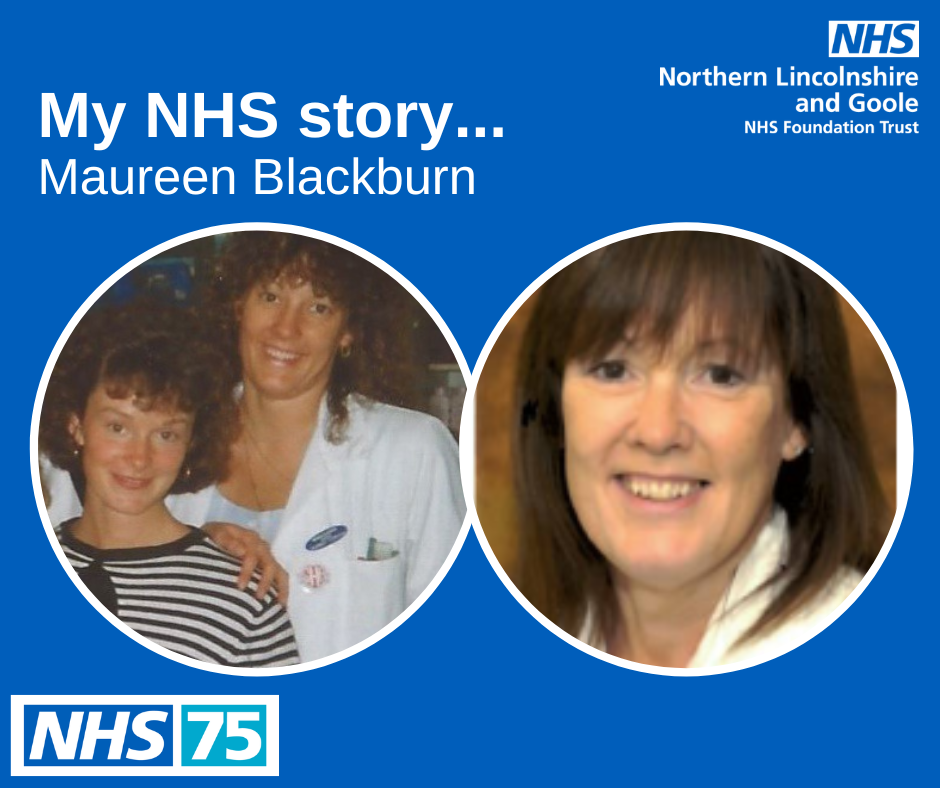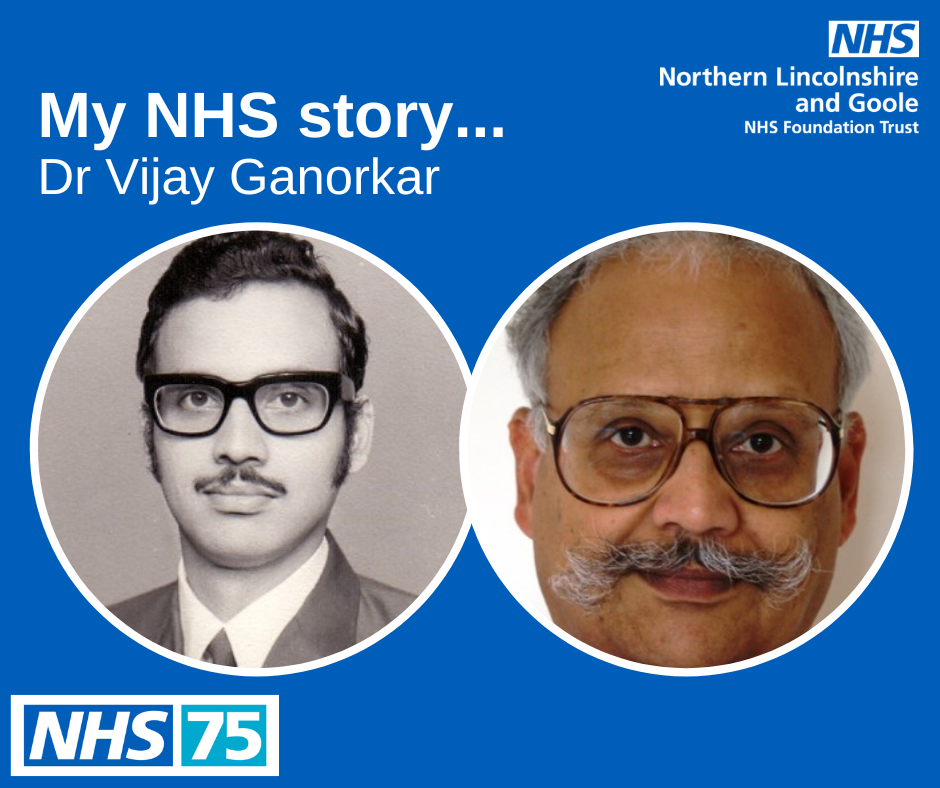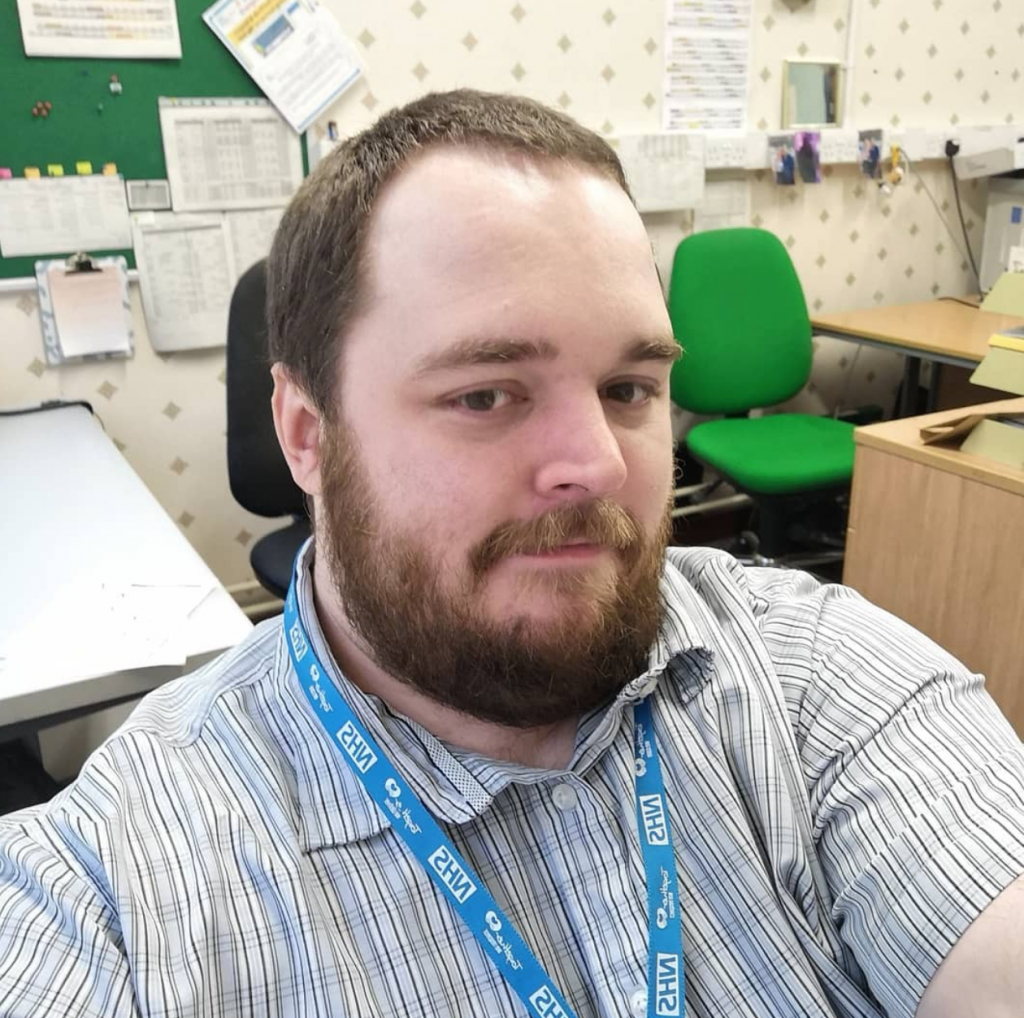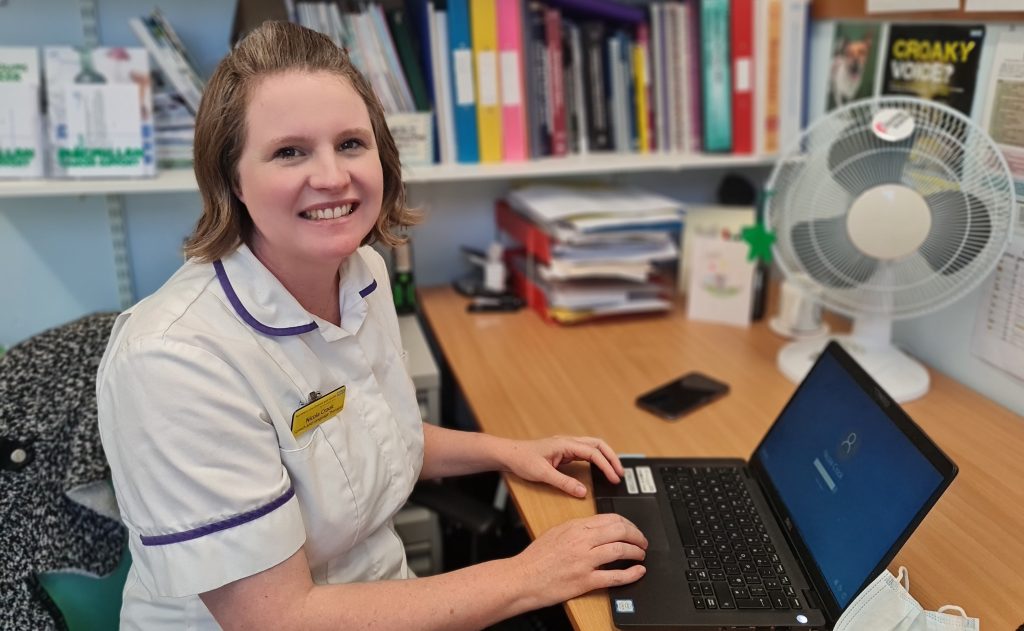There are more than 350 different NHS careers and everyone working for us makes a difference to people’s lives every day.
Here you can read about the careers of some of our brilliant staff who contribute hands-on or behind the scenes to excellent patient care.
Pharmacy milestones
Maureen Blackburn, Pharmacy Site Lead, joined SGH in 1984. She started as a Pharmacy Technician and has worked in many and in various roles in the department. Below she shares her NHS story including some milestones along the way!

She said: “I applied for and was successful in being appointed to a Senior Pharmacy Technician role for the dispensary in 1986 and then moved into the post of Principal Pharmacy Technician in 2002. More recently the role has changed to Pharmacy Site Lead.
“I’ve seen lots of change during my time at Scunthorpe and some I’ve seen or been involved in are:
- The building of the new Goole and District Hospital in 1989 and setting up the wards for pharmacy which saw the closure of the various smaller hospitals around Goole including St. Johns, Barts House and Thorpe Road
- The building of the Queens building at Scunthorpe hospital and setting up the wards for pharmacy, with the closure of Brumby hospital and Maternity home as those wards moved to Scunthorpe hospital. I was fortunate enough to see Queen Elizabeth II open the new building in 1993!
- Merging of the Diana, Princess of Wales Hospital with Scunthorpe General Hospital and Goole and District Hospital in 2001 to become NLaG which led to the centralisation of the pharmacy stores service at the Scunthorpe site
- The dispensary refurbishment at Scunthorpe hospital including the installation of our robot in 2006 and a new pharmacy computer system
- The refurbishment of the Pharmacy stores area in 2009
- Statutory registration with the General Pharmaceutical Council (GPhC) came into force on the 1st July 2011 for Pharmacy Technicians
- Outsourcing of our Outpatients Department prescription service to Lloyds in 2013 which enabled us to focus on the inpatient service we provide which has changed over the past 10 years where the Pharmacy teams are much more ward-based and delivering a full medicines optimisation service as you will know it today
- Introduction of the role of medicines management nurses in the department
- Introduction of the Abloy key system
- Electronic medicines management (eMM) we started using in 2014 which resulted in our teams being ward-based and inpatient prescription charts remaining on the ward
- Centralisation of the aseptic services unit in April 2017 at Grimsby hospital site
- Introduction of Electronic prescribing Medicines Administration (ePMA) at Goole then Scunthorpe in 2019 and Grimsby in 2020 – no more chasing paper charts 😊
“Obviously governance/risk management and technology has played a huge part in the way we work now and staff roles have changed significantly over the years. Some staff have come and gone- some have stayed I am pleased to say, but the one thing that has remained the same for me is the way the team pull together in times of need which has been tested multiple times over the years. None more so than during the pandemic and currently due to staffing difficulties.
“I hear the term ‘family’ being used on regular occasions and I wonder what role I fit into as I am old enough to be the mother and grandmother to some staff so that is where I will leave it – but I have to say my time has flown by and for the most part it has been an enjoyable ride with a few bumps in the road. I just want to take this opportunity to say thank you to all of the Pharmacy team for all that you do day in day out.”
51 not out
Dr Vijay Ganorkar, Consultant Radiologist, shares his story for NHS75…

“On 14 January 1972, on a cold morning, a young hopeful doctor landed at Heathrow. Arriving on an employment voucher, all he had was a guarantee of a month’s employment as Clinical attachment in the Radiology Department at East Birmingham Hospital.
“That doctor was me! I had in my pocket precisely £35 and $1. Some of that had to be spent on the coach to Victoria, the underground to Euston, the train to Birmingham New Street and finally a taxi to the hospital. On my first day in the Radiology Department, I was introduced by Dr Lawrence to the staff and shown to a portacabin that I shared with a senior registrar for the next month. The GMC had changed its mind and now wanted me to do a six month pre-registration job before it would grant me full registration. Fortunately, I managed to secure a post at Leighton Hospital, Crewe and having finished my attachment in Birmingham on Friday, started my job in Medicine on Monday. I had to buy a stethoscope as I had intended to train in Radiology and had left mine back in India.
“Within three months of arriving in England, I was fortunate to see HM The Queen and HRH Prince Philip at arms-length, at the official opening of Leighton Hospital. We stood in the corridor, with our bleeps switched off, in case they went off when the royal couple were talking to us!
“Soon afterwards, I was offered a trainee Radiology Registrar’s job at Manchester Royal Infirmary. Over the next few years, I progressed from registrar to senior registrar and was appointed as a Consultant at Pontefract General Infirmary in August 1981. I stayed for 30 years until my retirement at age 65. I was responsible for securing new X-ray equipment and starting Angiography, Mammography and CT scanning at Pontefract. Interestingly, Goole in those days was part of Pontefract and consultants from Pontefract also covered the old Bartholomew Hospital in Goole.
“Within a few days of retiring, I got a call asking me to work part-time at Goole. I have continued to work there for 11 years, thereby clocking up 51 years of uninterrupted service in the NHS.
“I was two-years-old when my father, who was in England at the time, met Nye Bevan, the father of the NHS at a reception at India House in London in 1948, so I can claim that my association with the NHS goes as far back as that!
“During lockdown, I was given a workstation so that I could continue to work from home. I feel lucky to have a job, doing the work I love and one that keeps this old brain ticking. I intend to keep on working for as long as the Trust and the NHS needs me.”
Moving on up
There are many different job roles within the NHS – many that you would not come across as a patient or visitor.
Kris (pictured) is our Diagnostics Systems Coordinator, he and his team of six are responsible for managing and running the radiology, cardiology and medical physics systems, including PACS, across the Trust.

He joined us seven years ago, following a career in the police force. Starting as a Ward Clerk in Grimsby’s Emergency Department, he gained a good understanding of the department and the patient flow throughout the hospital. Eager to learn more skills, Kris went on secondment for seven months as a Service Desk Administrator in the IT team, before returning to his normal role. In November 2015 he changed paths and began working as a Clinical Systems Administrator, looking after some of the IT systems his clinical colleagues use while providing data quality, system maintenance, training and advice. Fast forward three years and Kris started in his current role.
Over the course of seven years, he’s gone from not knowing which career path within the NHS he wanted to take to try a few different roles and now after much hard work he’s progressed into a higher paying role with more responsibility and a team of staff.
He says: “Working in the NHS can have its ups and downs, it can be a challenging place to work. However, I’ve been supported by the Trust to learn, develop and try new things. During my time here I’ve completed a Level 3 Management apprenticeship and have had the opportunity to attend and even speak at national conferences. I also Chair a meeting of the Yorkshire regions PACS Managers which allows the seven trusts to share learning and collaborate.”
“Seven years ago, I got my foot in the door and ever since I’ve pushed myself to learn as much as possible. The Trust has encouraged me to find my place, I’ve met many friends along the way and I’m now a regional expert in my field.”
Kris, Diagnostic Systems Coordinator
Changing lives
(Neil has asked that he and his family are not further identified and that only his first name is shared.)
Three years ago, 37-year-old Neil suffered a stroke so severe that his doctors told him that he was lucky to have survived.
The former Paratrooper and owner of a successful fitness group, was warned it was unlikely he would ever speak or walk again.
However, as a result of his sheer determination – and the support of his family and our Speech Language team – Neil is making a remarkable recovery.
Specialist Speech and Language Therapist Jasmin Kirk, supported Neil to learn his wedding vows just three months after he suffered his stroke and he was able to deliver these perfectly on his wedding day.
He is now not only able to walk short distances unaided, he even recently climbed Mam Tor.
His speech therapy has been led by Specialist Speech and Language Therapist (SLT) Dr Nicola Crook, our Clinical Lead SLT for stroke patients.

She recently did a PHD at Sheffield University which investigated the feasibility of delivering intensive therapies in the NHS using efficient methods, after winning one of 20 coveted places part-funded by the National Institute of Health Research Funding.
And now she has used that learning to create an innovative intensive programme of therapy for Neil.
She said: “The latest research suggests that having 20 hours of intensive therapy is the most effective treatment, so we reconfigured our way of working to put together a bespoke plan for Neil.”
The programme was delivered in two intensive blocks, using a combination of two speech therapists and two assistants, as well as digital tools such as communication apps.
Over the space of a month, the team worked with Neil to provide the 20 hour course, with a mix of outpatient appointments and home visits.
Neil and Emma also carried out additional exercises themselves and had further support from an independent practice programme.
Although it’s recommended that patients take a day off from therapy each week during the programme, Neil’s determination saw him doing exercises every day for between 10 minutes and an hour.
As a result, he has gone from being unable to read and only being able to say yes or no – albeit usually the wrong way around – to being able to read and retain small amounts of information and being able to hold a conversation.
I am so proud of Neil and the progress he has made. It’s not been easy for him but he is so determined to succeed and it’s been wonderful to see his confidence grow
Dr Nicola Crook, Specialist Speech and Language Therapist
Neil said: “The biggest thing I have got [from doing the programme] is confidence.
“I used to avoid answering the door but now, if we have a parcel delivered, I know I can say what I need to say. I know I can do it.
“I like being able to make small talk with people I see out walking their dogs.
“I know now that that I need to start speaking to more people, so we’re making an effort to get out and see the family.”
Dr Crook added: “I am so proud of Neil and the progress he has made. It’s not been easy for him but he is so determined to succeed and it’s been wonderful to see his confidence grow.
“He was the first person we offered this intensive treatment programme to and it has proved so successful we have since been able to offer it to further patients.
“Given the intensity of the programme, it is not something that is suitable for all our patients and also depends on our stroke Speech and Language Therapy team being fully staffed to deliver this intensity of therapy.
But for those patients who are suitable and motivated, I believe that it can be well worth the investment.”
His proud wife Emma also described Neil’s recovery so far as “amazing”.
She said: “He has spent the last couple of years shying away from people but doing this speech therapy programme has made him more confident.
“When he first started he didn’t want to see people and could maybe only say two or three words together.
“Now he’s able to say a lot more, he has more confidence – even with people he doesn’t know.
“We know we still have a long way to go but I know he can do it.”
The impact of a stroke
A stroke can have a huge impact on a patient’s speech and movement, causing significant damage to the areas of the brain responsible for controlling these functions.
As a result, relearning these skills for some people is an exhausting and slow process, as the brain has to find new ways of making the connections needed without using the area damaged by the stroke.
Dr Crook described that for some people, relearning these skills is a little like a road closure.
The quickest route – which you’re familiar and comfortable with – is no longer accessible and your brain needs to make a diversion.
“Going round” the damage in this way will take longer and you may get lost or confused along the way but, as you continue to take this “new route” it becomes easier and more familiar.
Eventually, you no longer try and use the old route and the new one becomes the norm – and getting you to this point is what the therapy is all about.